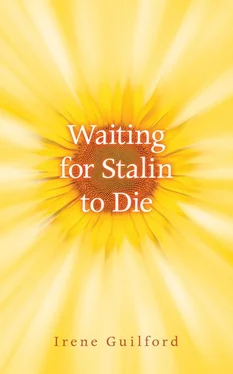“Well,” Birute said, dryly, “I will be there. Dobilas will look after it the same way he looks after everything else. The church. You. Me.”
Maryte still said nothing.
“You are his sister. His family. He won’t marry unless you agree.”
“ No one can take care of him as I do,” Maryte whispered, tears springing to her eyes.
“Of course not,” Birute said, feeling pity for this woman who would be left on her own, until she remembered the meddling that would likely ensue. “But I can help to take care of him. Could we not take care of him together? Surely two women are better than one.”
“You will push me into second place,” Maryte said.
“And how can I do that? You have been everything to him since the day he was born. You will always be his sister. He will always love you in a way he cannot love me. I don’t want to push you out. If you don’t believe me, ask Dobilas. He wouldn’t let that happen. He loves you too much. He will always be yours. You will still be able to keep an eye on him. And on me. So. What do you say?”
Maryte’s mouth started to quiver with misery.
“What does your brother think of this? Father Geras, what does he think?”
Birute took a risk. Without Maryte’s approval, Dobilas would not act. There would be no wedding. There would be no child. There would be no life of her own.
“I don’t know. I haven’t asked him. I came to you first.”
Maryte’s eyes widened.
“You came to me first? Really?”
Birute nodded. Then she played her last card.
“Maryte, I ask your permission to marry your brother. Please.”
Birute waited. After a time, Maryte nodded.
The church provided Dobilas an occupation but no pay. Knowing that she would have to make a living for them both, Birute pictured herself going out to work every day. She didn’t mind the idea. In fact she rather liked it. And imagining coming home to a meal prepared by her husband, she enjoyed the prospect of having a job, being married and, one day, having a baby.
She picked up the stolen aspirin tin, palm-sized with a dimple catch. Placing her thumb on the red half-moon near the hinge, she sprang it open. Twelve small tablets lay inside, flat and powdery white. Twelve pieces of possibility, untouched, pure as hope Snapping the tin shut and putting it in her pocket, she returned to the pharmacy.
The pharmacist worked behind the chest-high counter at the back of the store, just as before, only head and shoulders visible. Walking around the store, her eyes lingering on the merchandise, she could tell that once again he was aware of her. She approached the counter. She placed the aspirin tin before him. Nudging it with small movements of her fingertips, she edged it forward.
“Forgive, please.”
“I suppose you want a job,” the pharmacist said, not looking up from his work.
She nodded. How did he know?
“And why should I give you one?” he said, his eyes containing a twinkle of teasing.
Why indeed? Why give a job to a DP who spoke little English and had stolen from him. A slight panic rose within her. Her words came out in a rush.
“Because I sorry. Sorry,” she said with earnest sincerity, unable to remember the English for Labai . Very.
“And I get married,” she burst forth.
“Oh,” the pharmacist said, suppressing a smile. “Well then. In that case, I’d better give you a job.”
Birute wanted to race behind the counter. She wanted to fling her arms around him. English people did not do that kind of thing. They smiled. They nodded. She gave him a polite thank you.
“Can you do arithmetic?”
She nodded, maintaining a straight face.
“Good. Then you can handle the cash register. You won’t need much more than Hello, Thank You, Goodbye. If you have trouble with language, just come to me. You’ll learn quickly enough. My name is Miller, by the way. Pete Miller. But you must call me Mr . Miller. Especially in front of customers. Do you understand?”
She was struck by the unpleasant thought that, to the pharmacist, she appeared much as Dobilas did to the world. Ashamed that it had not occurred to her before, chagrined at the secret satisfaction of her own condescension, she felt the swift kick of guilt. Dobilas must feel like this all the time, she thought. And a fierce new tenderness rising up in her, she resolved never to tease him again.
“Monday morning. 9 a.m.,” the pharmacist said.
“Monday morning. 9 a.m.,” she said. “Hello. Thank you. Goodbye. Please come again.” She grinned, teasing and cheeky. “ Mr. Miller. ”
Happiness burbled up in her. She began giggling, then laughed, letting loose long ripples that travelled through her body, leaving her in a dazed, pleasurable state. Poor man, Birute thought as her laughter subsided. He really must think he’s hired an idiot. And with a friendly wave, she left.
She walked back along Dundas on bouncing steps. Nearing the church, she thought of the good news she was about to impart to her brother. She had a job. She was going to get married. Maryte wasn’t going to stop it. Nor, she hoped, would he.
She waited until dinner when her brother would be settled and quiet, content with her food and company. Cutting the soft beef and pork patties with his fork, he carried the moist soft meat to his mouth. She watched him eat. Someone else would keep him company or perhaps no one at all. And heart sinking, imagining her brother alone, she sat down across from him.
“Aren’t you eating?” he asked.
She shook her head, thinking of the parting of daily ways that would take place after her marriage. She would no longer hold up his cassock for him to slip into, no longer stand back to watch as he did up the row of small buttons along the front. A woman would be found to wash his clothes, cook his meals and make his bed. But who would take care of him, her brother priest? Perhaps no one.
For a moment she wavered at the prospect of leaving her brother. He had protected her from indifferent fathers, cruel brothers and an angry mother. They had left home, outwitted soldiers in the forest, travelled across an ocean to a new land. They had kept secret company. They had held together. And never expecting that she would be the one to leave, she quietly told him her news.
He lay down his knife and fork.
“You can’t marry.”
“Why not?” She had not expected this. She had thought he would be happy, perhaps even relieved to be rid of her and free to work. “Do you mean I can’t marry at all, or that I can’t marry Dobilas?
“Both.”
“And why can’t I marry him?” she said, bristling at the thought that Dobilas might not be considered suitable, that she might not be free to choose whom she might love, that she might not be free to marry if she so wished.
“Because you will be lumbered with an idiot,” he said, his face taking on the distinctly unpriestly look which only Birute knew. “You will have to look after him all your life. What about when you are both old? Have you thought about that?”
“Of course, I’ve thought about that. I already look after you and the house. I help out in the church. I’ll manage. Besides, he’s not as stupid as he looks. He understands a lot.” Sometimes more than you, she wanted to say.
He struggled as if reluctant to speak.
“What if you have children? What if they are born like him? What will you do then?”
“What of it?” Birute tossed out. She had to admit that she hadn’t thought of this before but it didn’t trouble her much. How many idiots could one family have? If anything Dobilas would make a more understanding parent.
Читать дальше












